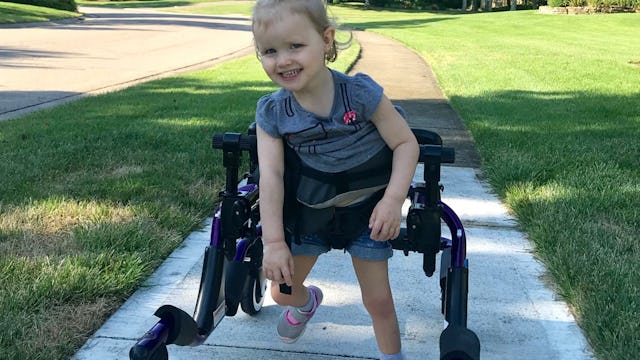This Is How I Explain My Daughter's Medical Condition To Others

A week before my daughter was scheduled to start preschool, I spoke with her teacher and learned that a field trip was planned for her third day of class. The kids would be going to a farm, and each child was asked to bring a parent or guardian to accompany them. This would be a great opportunity for the two of us to get to know both the children and their parents.
At first, I thought about how fortunate the timing was. And then I became nervous. My daughter has a rare chromosome deletion, which has caused significant developmental delays and health concerns. I’ve spent a lot of time worrying about how the kids will react to her differences. I’ve spent zero time considering how I might talk to the parents about her. And suddenly I felt overwhelmed with the responsibility of accurately portraying my daughter.
We’re often around other families — in our neighborhood, at playgroup, therapy, and church. But those families have “grown up” with us in varying degrees. Although they likely don’t know the details of my daughter’s diagnosis, they have a certain level of understanding because they have spent time with her. This will be a completely new batch of families. It will be clear to the adults that she is a little bit different because she won’t be walking and is mostly non-verbal.
So how do I do her justice in representing her full personality, not just her diagnosis? This is important not only in connecting with the other parents, but also because what I tell them may be passed along to their children should they ask about her.
As I thought about it, I heard a very clear direction:
Tell them the truth.
The truth? That seems a little overwhelming.
But then I thought about what the truth really means. It means to be honest. But it doesn’t mean I have to go into the nitty-gritty detail of the challenges. It means that I can focus on the things that we have in common. I have the opportunity to help shape thinking and build relationships. This is an opportunity to highlight many of our similarities and also address a few of the differences in a non-threatening way.
Tell them the truth…
Tell them that she’s a kid, just like their child.
That she loves chicken nuggets, music, and going for bike rides.
That blowing raspberries on her belly and tickling her feet will always make her laugh.
That bath time, books and a good session on the swings will soothe her soul.
Tell them the truth…
That’s she’s both excited and nervous to come to a classroom full of new people and things.
That some activities will be harder for her than they are for others, but that her ability to overcome adversity inspires.
That there are many great things we can all learn from her.
That she excels in areas that others may not, including laughter, joy, and sincerity.
Tell them the truth…
That they may not always understand her reaction to activities, but that patience will always be appreciated.
That there are many ways that we can learn to communicate with her, even if she doesn’t speak.
That friendships come in all shapes and sizes, and that her differences don’t mean that our children can’t enjoy one another.
Tell them the truth…
That our family is excited to be included in the classroom, and that we long for and appreciate their acceptance.
That sometimes the journey of a child with special needs is lonely for the parents, and we’re excited to be part of a community.
That we’ve prayed for this day since she was very little, and that we’re glad to meet the people that have been placed on this path with us.
Tell them the truth.
This article was originally published on